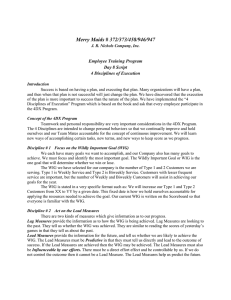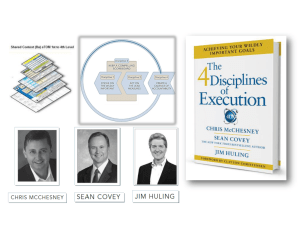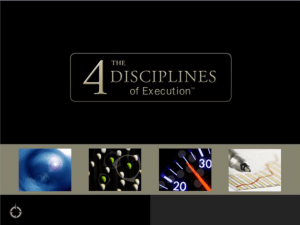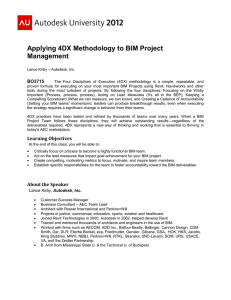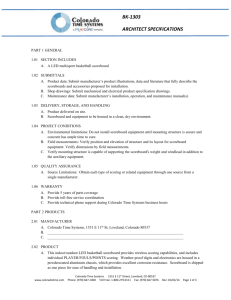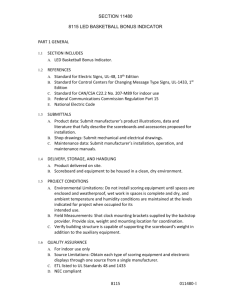4DX
advertisement
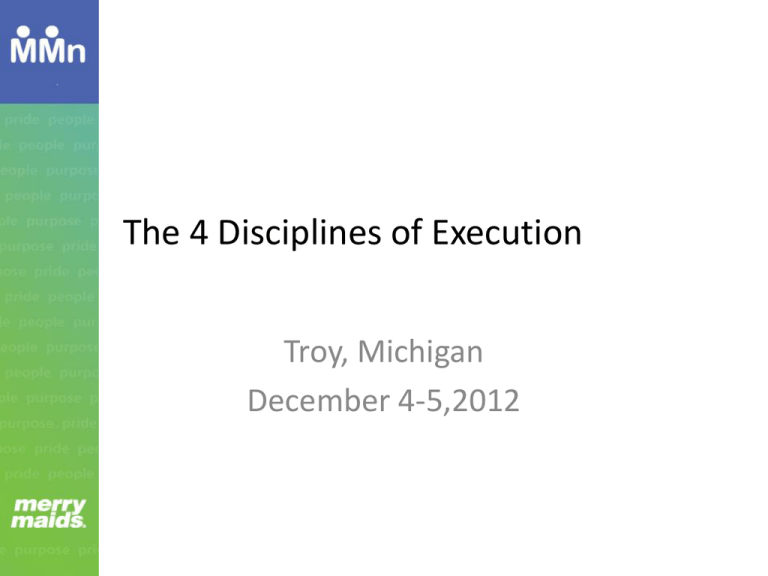
The 4 Disciplines of Execution Troy, Michigan December 4-5,2012 Strategic Planning Stroke of the Pen Why do we exist? Mission Statement What does success look like? Vision Statement How do we get there? Strategic Plan Day to Day Behavior Change Strategic Planning • Why does the organization exist? – Mission Statement • “Gain. Retain. Serve.” • What does success look like? – Vision Statement • “To provide World Class Customer Service to everyone we meet. And to provide the highest value and quality services possible.” • How do we get there? – Strategic Plan Strategic Planning • 3 Distinct Categories of Actions – Stroke of The Pen • If the resources are available, these decisions are made and put into place. – Day to Day Operations (The Whirlwind) • • • • The bottom line (Financial) Processes and Programs (Operational Employee development and training (Employee) Customer Satisfaction and Market Share (Customer) – Behavior Change Behavior Change • The most difficult part of executing the Strategic Plan is changing human behavior. • If the organization wants different results, the organization must do something different • People resist change not because they don’t like change, but because they are comfortable with the way things are. • The 4 Disciplines of Execution (4DX) provides a pathway for behavior change The 4 Disciplines of Execution • The goal of 4DX is to create habits to achieve the WIG • The process is counterintuitive – We must say “No” to good ideas • Says easy, does hard The 4 Disciplines of Execution Focus on The Wildly Important Act on Lead Measures Create a Compelling Scoreboard Create a Cadence of Accountability Focus on The Wildly Important (WIG) • The WIG is defined as the War. The one goal that if not reached will render all other goals meaningless • Each organization should have no more that 1 or 2 WIGs. – Each division may have sub-WIGs (battles), but those sub-WIGs must support the organization’s WIG • The goal is to identify the least number of battles necessary to win the War. • Defined as: “From X to Y by when” Act on Lead Measures • Lag Measure vs. Lead Measure – Lag measures are a measurement of something that has already happened (the outcome) – Lead measures are a measurement of behavior or actions • The Lead Measure is a calculated bet that, if achieved, will positively affect progress on the WIG • Lead Measures must be predictive and influencable Create a Compelling Scoreboard • People are playing different when they are keeping score • The scoreboard is Simple • The scoreboard is Highly Visible • The scoreboard has The Right Lead and Lag Measures • The scoreboard tells us immediately if you are Winning or Losing Sample Scoreboard Create a Cadence of Accountability • Weekly Company Meetings • 15-20 minutes in length • Agenda: – Report on Last Week’s Commitment – Review and Update the Scoreboard – Make Commitments for the Next Week • “What are the 1 or 2 most important things I can do THIS WEEK to impact the team’s performance on the scoreboard?” Create a Cadence of Accountability • • • • • Weekly Team Meetings 10-15 Minutes in Length Review and Update the Scoreboard Discuss Lead Measure Activity Leader makes commitments to help the team for the next week 4DX Office Implementation • Review 4DX program with Team Members • Develop Lead Measures – 1 or 2 for Gaining Customers – 1 or 2 for Keeping Customers – 1 or 2 for Quality Control • Create Scoreboard • Schedule Team Meetings WIG Company WIG Increase weekly sales from $22k to $30k by 352 Increase Type 1 & 2 from 105 to 130 by 313 Livonia WIG Increase Type 1 & 2 from 181 to 225 by 313 Troy WIG Increase Type 1 & 2 from 52 to 68 by 313 Peoria WIG Lead Measures Get Keep Quality 1. Close 60% of Estimates with MMA Agreement 2. Contact 5 Type 3,4, & 5 Customers and Former Customers per week and offer MMA 3. Distribute 5 Doorhangers at 90% of Homes Weekly 1. Inspect each others work and correct problems in 90% of homes. Identify 1 positive and 1 negative thing that was found in each home inspected 2. Send same team to weekly/biweekly customers 80% of the time 1. Perform 2 Quality Checks per person per week. 2. Contact new customer each cleaning for the first 3 cleanings 80% of the time. (At least one contact must be a physical inspection)
